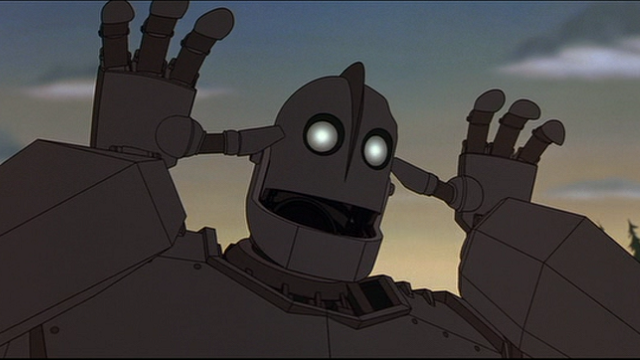I have a set of movies that I watch to see if my emotions need recalibrating. If I’ve had too many muted reactions to movies in a row, or feel like nothing is grasping me on any sort of realistic level, I have to find out if it’s just me being out of it, or if it is actually the movies that are out of it. The Iron Giant is one of those movies. Released without fanfare in the crowded early August of 1999, The Iron Giant was a movie that nobody was watching. Not even my fellow theater co-workers. If it wasn’t for a recommendation by a lone patron at the theater I was working, I wouldn’t have given it a chance.
At the dawn of the new millennium, as people were worrying about stupid things like the Y2K bug (in which people worried that old programs using a 2 digit year would suddenly destroy our infrastructure), the retro movie was back in style. Although the 1950s/1960s nostalgia can be traced back to the sitcom remakes of the early 1990s, the end of the decade was trying to grasp the use of retro tropisms to tell a story about modern culture. Pleasantville, Blast From the Past, October Sky and The Iron Giant were based heavily in 1950s pop culture to explain how we got from there to here.
Brad Bird’s The Iron Giant interrogates propagandic 1950s imagery by telling the story of a boy and his giant pet robot from Mars. Late at night, a mysterious giant robot crash landed near a small town in Maine where he befriends an adolescent boy named Hogarth Hughes. Hogarth and the robot spend time down at the scrapyard where the robot can eat dinner to his heart’s content. But, as per usual with 1950s films and the fear of the other, the army is called in to monitor the threat to national security.
What is national security when it shoots first and asks questions later? Not surprisingly, The Iron Giant was released after the fall of the Berlin Wall but before the post-9/11 paranoia, a time period where we could ask questions about our government’s secret dealings without having to look at our consequences in the face. The questions aren’t just about fear of the other, but also how reactionary people are to outsiders and foreigners. Back in the 1950s, fear of the other was widely accepted as the other was represented by the McCarthy red scare…that is, a fear that Russian influences would take over our country from the inside out. The Iron Giant questions those blind fears of the other and ponders the intentions of those who would spread and act upon those fears. Just because those fears come from the government doesn’t necessarily mean that those fears are valid.
Political themes aside, this is a tale of a boy and his best friend (who happens to be a giant robot from Mars). They form a bond akin to that of Lassie and her masters, or the group in Stand By Me. Hogarth and the robot discuss intent vs programming and good vs evil, bonding over comic books and trips to the swimming hole. By engaging in such childhood pastimes, the audience also bonds with the pair, making the climax more stressful and fraught with worry than other movies of its ilk.
I only pull The Iron Giant out on special occasions. I don’t want to wear out its quality, and it still provides a fantastic check to see if I still can be emotionally won over by this little movie that could. It gets awful dusty when I’m watching this film. No, you’re the one who’s crying. There’s just something in my eye.

